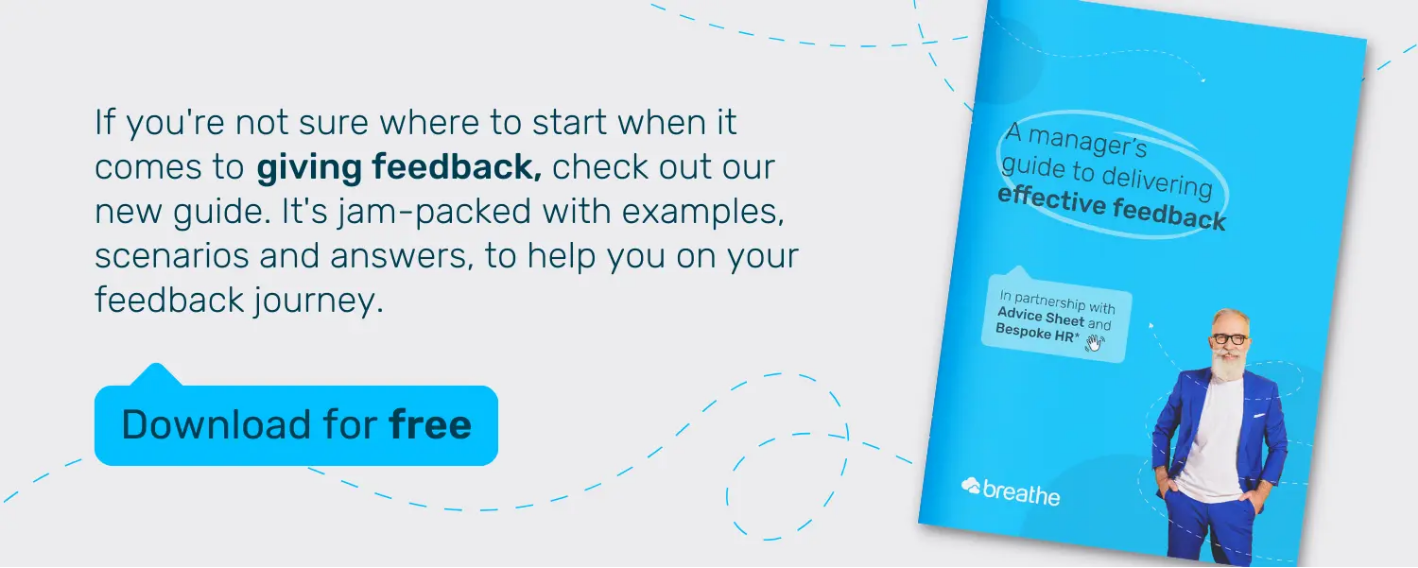Most small businesses have performance appraisals. Appraisals assess employees against objectives and works as a guide for employees on their future development.
Although there is no legal requirement for employers to conduct appraisals, most employers choose to implement appraisal systems to support employee development, manage performance, and facilitate career discussions.
When appraisal systems are managed well, people continually progress and achieve more. In this way, employee appraisal systems can make a significant contribution to the overall success of a business.
But what are the pros and cons of appraisal systems?
Skip to:
What are performance appraisals?
What are the different types of employee appraisal systems?
The pros of performance appraisal systems
Detailed benefits of performance appraisals
Self-evaluation in the appraisal process
Integrating performance review software in appraisals
What are performance appraisals?
Appraisals are usually led by the employee’s line manager - the person who knows their work best.
At heart, it’s about understanding how someone’s getting on: what’s going well, where they’re shining, and where there might be room to grow.
The purpose of performance appraisals goes beyond simply grading or ranking. Done well, they provide:
-
Clarity - helping employees understand what’s expected of them.
-
Feedback - offering insight into strengths, achievements, and areas for improvement.
-
Development - identifying training needs, career goals, and opportunities for progression.
-
Alignment - linking individual objectives with wider business goals to ensure everyone is pulling in the same direction.
Most appraisals include several key components:
-
Review of objectives: comparing current performance against goals set in previous reviews.
-
Feedback discussions: an open conversation between manager and employee to explore progress, challenges, and achievements.
-
Goal setting: agreeing on new targets, KPIs, or development milestones for the next period.
-
Documentation: keeping a clear record to track performance trends and inform future decisions.
An appraisal should feel like a two-way conversation - not a one-sided review. It’s a chance for you and your team member to reflect on what’s gone well, talk honestly about any challenges, and set clear, shared goals for the future.
Handled well, appraisals can be a real turning point - recognising achievements while building a plan for what comes next.
Just to be clear: appraisals are separate from any disciplinary process. If there are serious concerns, those should be managed through a formal route.
Did you know?
-
As of spring 2025, just 10 % of UK employees report feeling engaged with their work - one of the lowest rates globally - costing the UK economy an estimated £293 billion annually in lost productivity.
-
In organisations where leaders visibly prioritise people issues in decision-making, employee engagement rises to 77 %, compared with far lower levels in less people-conscious workplaces.
-
On the topic of retention, 72% of UK employees say they would like to still be working for their company in two years’ time.
Appraisals can have a big impact on how engaged your people feel - and how motivated they are to do their best work.
What are the different types of employee appraisal systems?
Appraisal systems come in all shapes and sizes. The most common is the annual review, usually led by line managers. It’s often used to reflect on progress against previously set objectives and explore goals for the year ahead.
Some systems use a mix of ranking and narrative approaches - combining scores or ratings with written feedback to give a fuller picture.
Others take a more rounded view. A 360 degree review brings in feedback from people the employee works with regularly - managers, peers, direct reports, and sometimes even customers. The idea is to build a more balanced view based on input from different touchpoints, rather than relying on one person’s perspective.
Self-evaluation can also play a useful role. When employees reflect on their own progress, it can lead to more open, thoughtful conversations - and help highlight differences in perception that are worth exploring together.
The most effective appraisal systems clearly define goals and KPIs. This makes it easier for both the manager and employee to agree what good performance looks like - and to track progress in a way that feels fair and transparent.
Then there are the more informal approaches. Regular one-to-ones or check-ins offer ongoing space to review progress, talk about challenges, and adjust goals if needed.
The pros of performance appraisal systems
The biggest advantage of an appraisal system is that it allows feedback on how to develop and add more value to the organisation.
Appraisals aren’t just about looking back - they help you plan ahead too. One of their biggest benefits is spotting where people might need support, like extra training or development.
When you look at this information across the whole team, it can help HR and managers identify wider skills gaps and shape future training opportunities.
Some businesses also use appraisal outcomes to help inform decisions around pay rises or promotions. If you’re using a grading system, this can provide a consistent way to guide those decisions - while making sure they’re based on real performance.
Appraisal data can also feed into longer-term planning, helping to spot future leaders and support succession planning across the organisation.
A well-run appraisal system gives you a clear view of how each person is doing - and that insight supports confident, fair HR decisions.
If someone’s consistently underperforming, regular performance reviews can help track whether things are improving over time. And if formal steps are needed, those reviews provide a record of what’s been discussed and agreed.
More broadly, appraisal data can support planning around things like promotions, development opportunities and future workforce needs - so you’re not just reacting to problems, but making thoughtful, forward-looking decisions.
Appraisals open up space for honest, two-way conversations. They’re a chance to talk about progress, challenges and development - and for both sides to share feedback.
But if they only happen once a year, they can feel a bit disconnected. Regular one-to-ones and check-ins keep the conversation going, helping to set expectations, surface issues early, and build trust across the team.
More frequent dialogue doesn’t just solve problems - it lifts morale too.
Appraisals can be a great motivator. When you recognise achievements and involve people in setting their own goals, it helps them feel valued and engaged, while keeping performance on track.
Detailed benefits of performance appraisals
When done well, appraisals are about much more than ticking a box. They’re a valuable opportunity to support employee growth, strengthen relationships, and align your team’s efforts with your business goals.
Here are five people-first benefits of an appraisal - and how they can make a real difference:
1. Boosting engagement and motivation
When employees receive regular, thoughtful feedback, they feel valued. Appraisals help shine a light on what’s going well and where to go next. This recognition, paired with clear goals, boosts morale and keeps people motivated. Feedback and performance issues are formally discussed during the appraisal meeting, ensuring clarity and constructive dialogue.
2. Creating space for recognition
Whether someone’s smashed a target or simply shown up and done their job well every day, appraisals are a chance to say, “We see you.” Taking time to recognise effort and impact helps build trust and loyalty.
3. Supporting growth through training
Appraisals are a great moment to identify skills gaps and shape development plans that work for both the individual and the business. This keeps people growing and ensures teams have what they need to succeed.
4. Helping people stay and grow
When employees can see a clear path forward - and know their ambitions are heard - they’re more likely to stay. Linking appraisals with progression shows you’re invested in their future, not just their performance today.
5. Driving better employee performance
A good appraisal sets clear expectations and gives employees the support they need to meet them. It’s a space for honest conversations, meaningful feedback, and shared goals - laying the groundwork for stronger performance, day in and day out. The appraisal process helps build a comprehensive record of the employee's performance over time, which can be discussed during meetings to support ongoing development.
Enhances communication
Effective performance appraisals are honestly one of the most powerful tools you've got for boosting communication in your workplace.
The appraisal process gives you and your team dedicated time to have those open, honest conversations about performance, goals, and any concerns that might've come up during the review period.
These touchpoints help build trust and transparency, making it easier to spot issues early, offer support when it’s needed, and celebrate the wins together.
Appraisals aren’t just a tick-box exercise. They’re a chance to connect - with your people, their goals, and the work they’re doing day to day. When your team’s actively involved in performance reviews, it opens up a two-way dialogue. Feedback flows both ways. That means you can spot training needs, identify areas for growth, and uncover valuable insights that might otherwise go unseen.
Done regularly, these conversations are key to improving employee performance and alignment. They help everyone pull in the same direction, giving clarity and purpose to the work your team’s doing.
At the heart of it, performance appraisals help create a culture where feedback and development are part of the everyday - not something reserved for once or twice a year. And that’s how you build a workplace where people feel supported, valued, and motivated to do their best work.
The cons of appraisal systems
Critics of the appraisal system reason that companies should focus more on improving processes and systems than getting the workers to improve. They say it shouldn't be for the individual staff members to work faster, more carefully, or more diligently; but that the company should adjust its methods of working and improve where the procedures are failing.
That aside, reviews and appraisals can be viewed quite negatively by employees. Some staff feel they are one-sided and judgemental. Traditional appraisal systems do tend to focus on the negative and generate criticisms of the employee from the person that is one step further up the hierarchy.
Managers too are often guilty of reviewing staff based on their personal characteristics, rather than on their achievements. Character traits may not be entirely relevant to the work the employee is doing, so criticisms can feel unjustified, especially if a worker is otherwise feeling that they are succeeding in their job. Self-appraisal goes some way to assisting with this, but it can be difficult for an employee to honestly assess themselves.
Scores-based appraisals can be demotivating, as it can be disappointing to be deemed average. Most employees are hard-working, good people who turn up on time, work diligently, achieve their targets and enjoy good relationships with their colleagues.
But scoring employees will necessarily rate these good achievers in with the regular and typical workers. It will therefore make them “average”. It will make them a three out of five. But it can be dispiriting to be average. If you're doing what is expected of you, why are you not better than a three? Why are you not a five?
Appraisal systems are often seen as being inconsistent. Even with a clearly set out appraisal system, it's difficult to expect a number of managers to all operate in exactly the same way. Different managers will review people differently, and favouritism and prejudice can lead to inconsistency in how one reviewer appraises each of his subordinates.
Paper-based appraisal systems are time-consuming and inefficient, especially in smaller companies. Discover how to give effective feedback to your team to include in performance appraisals with our free manager's guide to delivering feedback.
Self-evaluation in the appraisal process
Self-evaluation is a key part of the appraisal process - and it’s your chance to take a step back and think about how things are going. It’s about owning your progress, recognising what you’ve achieved, and being honest about what’s been challenging.
When you're in that appraisal meeting, you'll want to dig into your self-evaluation, sharing what you've achieved, the challenges you've faced, and any concerns you might have about your role or what's expected of you.
This open chat gives both you and your line manager some real insights into how you're seeing things from your side. You can share the wins you’re proud of, flag any concerns, and talk about what support you might need moving forward.
It also helps your manager see things from your perspective - giving them insight into how you’re experiencing your role, your goals, and the day-to-day. And that’s what makes the conversation a two-way one, grounded in trust and understanding.
Integrating performance review software in appraisals
If you’ve ever felt unsure about how to run an appraisal - or found yourself drowning in paperwork - you’re not alone.
Traditional appraisal methods can be inconsistent, confusing and hard to keep on top of. Managers might use different approaches, records get lost in folders or spreadsheets, and feedback often ends up being vague or forgotten.
But appraisals don’t have to feel like a tick-box exercise.
With the right performance review software, you can make appraisals feel more useful - for your people and your business.
Make appraisals fair and clear
Using software means everyone’s working to the same set of criteria. It’s easier to set goals, track progress, and keep everything in one place. That makes it fairer and more transparent for your team - and simpler for you to manage.
Get the full picture
With all your appraisal data in one place, you’ll start to spot patterns. Things like common strengths, gaps in skills, or people who might be at risk of burnout. It helps you make better decisions and give the right kind of support.
Build a culture of feedback
The best workplaces don’t just give feedback once a year - they build it into everyday conversations. Tools like real-time recognition and check-in reminders make it easy to keep the momentum going and keep your people feeling valued.
Save time on admin
Appraisal software takes care of the bits that usually take up time - like chasing forms or filing notes. You can focus more on having meaningful conversations, and less on the paperwork.
Designed for small UK businesses
Breathe HR was built with small businesses in mind. It’s simple to use, secure, and made for teams who want to grow - without the HR admin holding them back.
Performance review software won’t replace people - it just gives you more time and headspace to support them. And when your team feels supported, they’re more likely to grow, thrive, and stick around.
Your simple checklist
Appraisals don’t need to be daunting. With a little preparation and the right approach, they can become one of your most useful people tools.
Use this checklist to guide you through each stage - from prep to follow-up.
Before the appraisal
[ ] Set the date early
Give plenty of notice so there's time to prepare and no last-minute stress.
[ ] Agree on what you’ll cover
Share a simple agenda - think goals, feedback, development. Make it clear and easy to follow.
[ ] Gather notes and evidence
Look at performance data, feedback, and previous goals. Encourage your employee to do the same.
[ ] Choose the right space
Make sure it’s private, quiet and free from distractions - whether that’s in person or online.
During the appraisal
[ ] Start with a check-in
Ask how they’re feeling about their role. Let the conversation flow naturally.
[ ] Review the year (or period)
Talk through wins, challenges, and progress against goals. Keep it balanced and fair.
[ ] Give and ask for feedback
Make time for two-way feedback. It should feel like a conversation, not a critique.
[ ] Set new goals together
Make sure goals are clear, achievable, and linked to business priorities. Write them down there and then.
[ ] Talk development
Ask what they’d like to learn or improve - and explore how you can support that.
After the appraisal
[ ] Write up a summary
Keep it short and action-focused. Use your appraisal software to log it securely.
[ ] Follow up with agreed actions
Book any training, share resources, or schedule check-ins.
[ ] Keep the conversation going
Appraisals shouldn’t be once a year and done. Use 1:1s to check in on progress regularly.
The future of appraisals
The future of appraisals is changing fast, and it's being shaped by new tech, what your people actually want, and the need for performance management in a world that doesn't stand still.
There's also this growing trend towards more frequent, informal performance reviews with line managers, moving away from that dreaded annual appraisal that everyone used to hate.
With performance management software now part of everyday working life, appraisal systems are becoming more streamlined, more flexible, and more insightful. Real-time feedback, progress tracking, and smarter ways to stay connected - these tools are making it easier to support your team without the stress.
More businesses are choosing regular, informal check-ins instead. That means feedback happens when it’s needed - not months after the fact. And for remote or hybrid teams, that consistency and connection can make all the difference.
As expectations shift, so do the systems. The focus is now on meaningful development, open conversations, and performance management that’s built to flex and grow with your business.
Stay open to these changes, and you’ll create appraisal processes your team actually values - tools that support real growth, not just tick boxes.

Author: Aimée Brougham-Chandler
An IDM-certified Digital Copywriter (2023) & English Language & Literature graduate (BA Hons), Aimée is Breathe's Content Assistant. With 3 years' content marketing experience, Aimée has a passion for writing - and providing SME HR teams with solutions to their problems. She enjoys delving into & demystifying all things HR: from employee performance to health and wellbeing, leave to company culture & much more.







